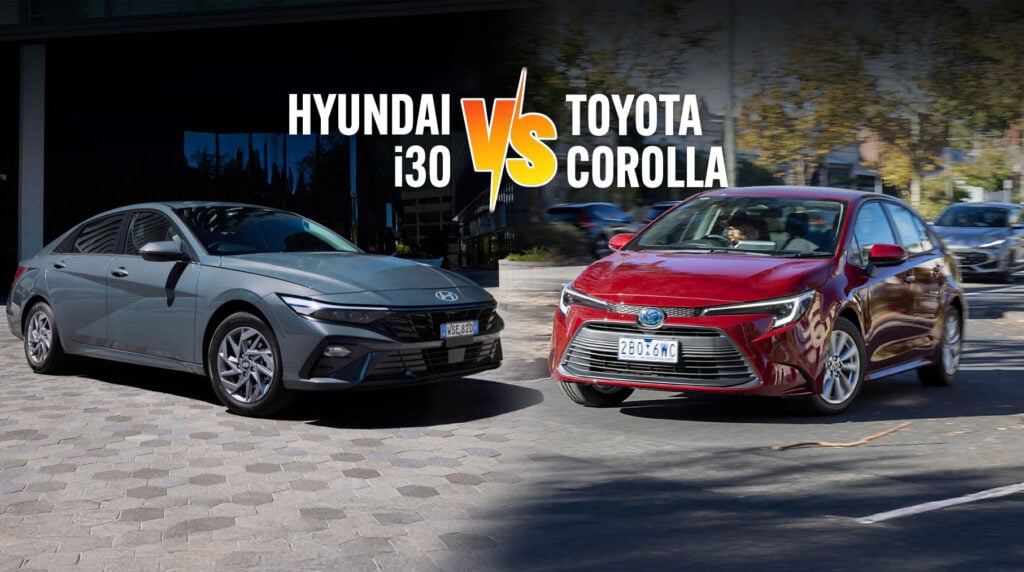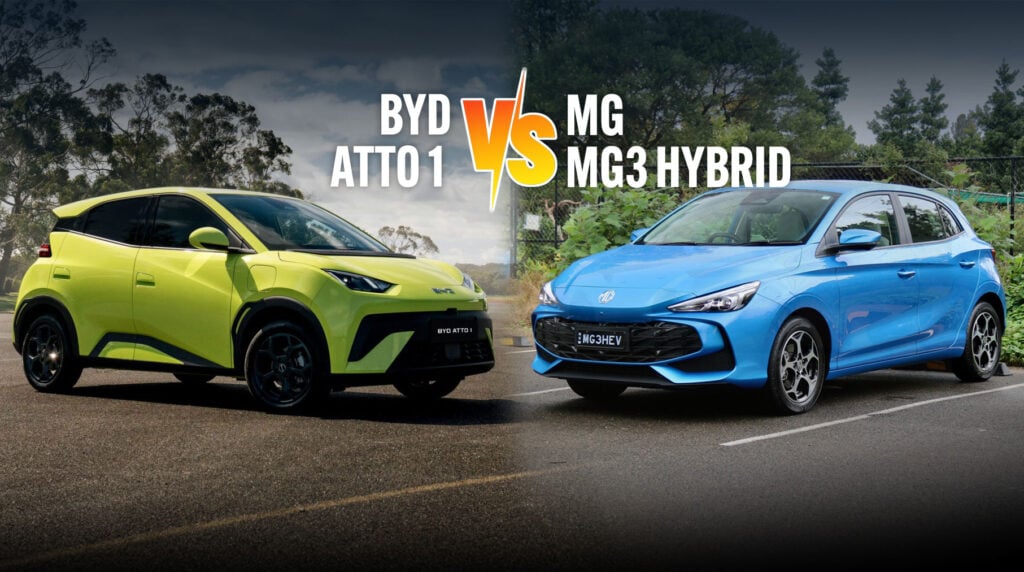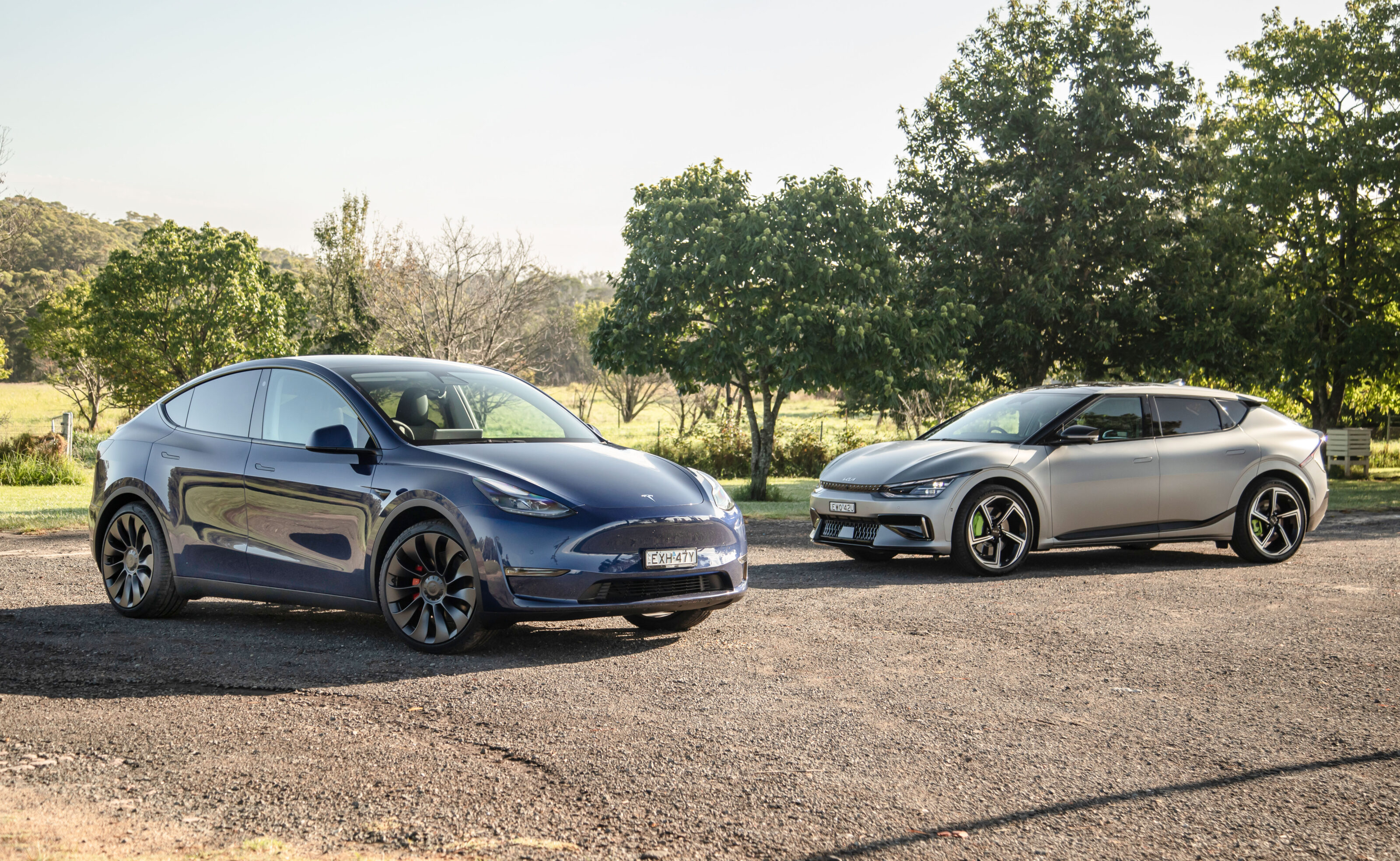
You’ve got $100K burning a hole in your pocket and you want to go fast. Real fast.
Turns out, you can crack the ton in under four seconds for that outlay – and not by buying some spine-compressing rally rocket or depreciated exotica. No, you can go that fast in SUVs with space for five adults in comfort.
For that, we can thank the instant output and efficiency of electric motors, but as Wheels readers will know, outright speed is not enough. In fact, it gets boring pretty quickly. Performance cars – which the Tesla Model Y Performance and Kia EV6 GT profess to be – must deliver more than just face-melting acceleration.
The 2023 Kia EV6 GT has a lot going for it on paper.
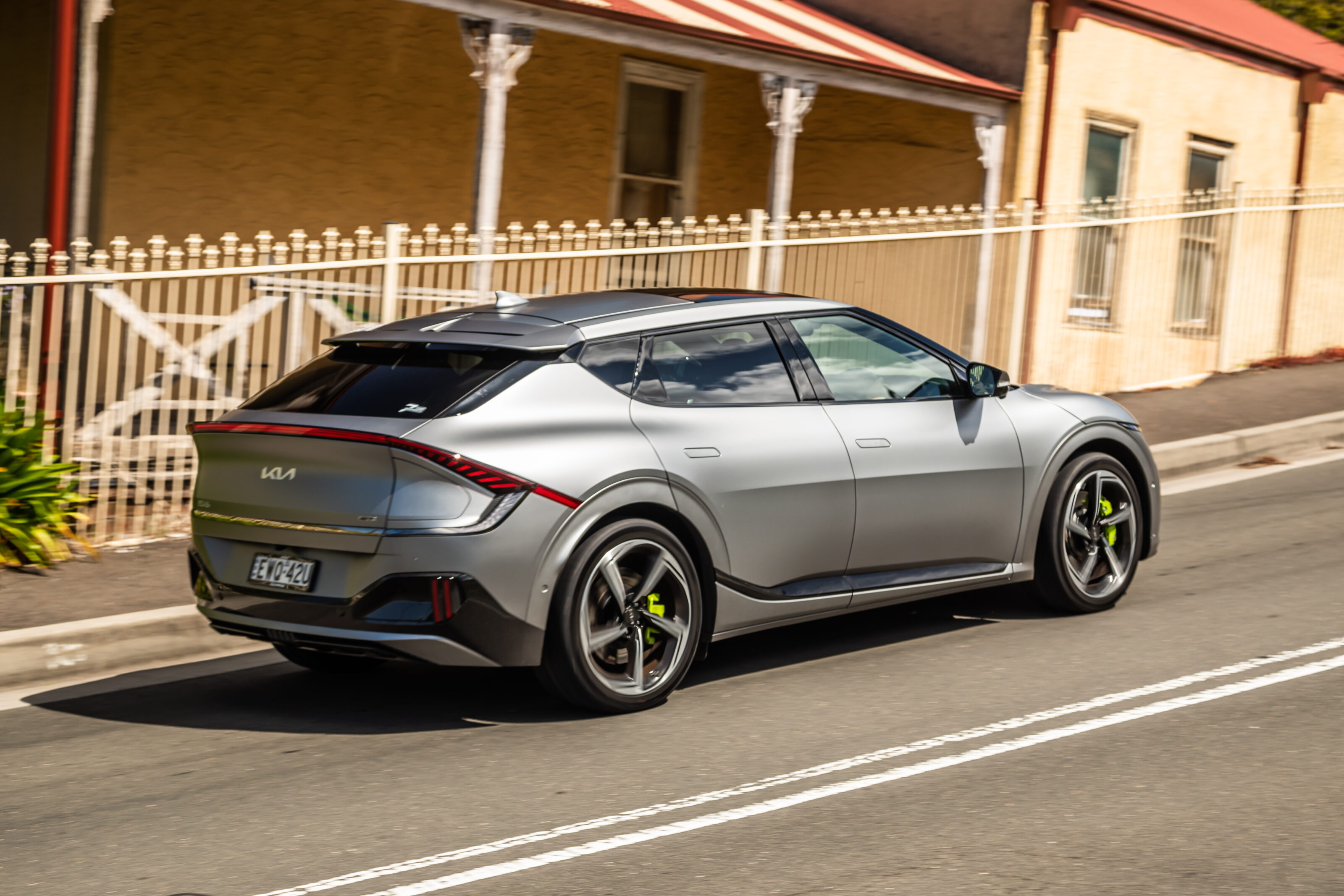
The EV6 GT’s twin electric motors churn out 430kW to get it to 100km/h in 3.5 seconds – and that’s backed up by ensconcing bucket seats, Australian-tuned adaptive dampers, and a clever torque-vectoring limited-slip rear differential.
Tesla’s Model Y Performance?
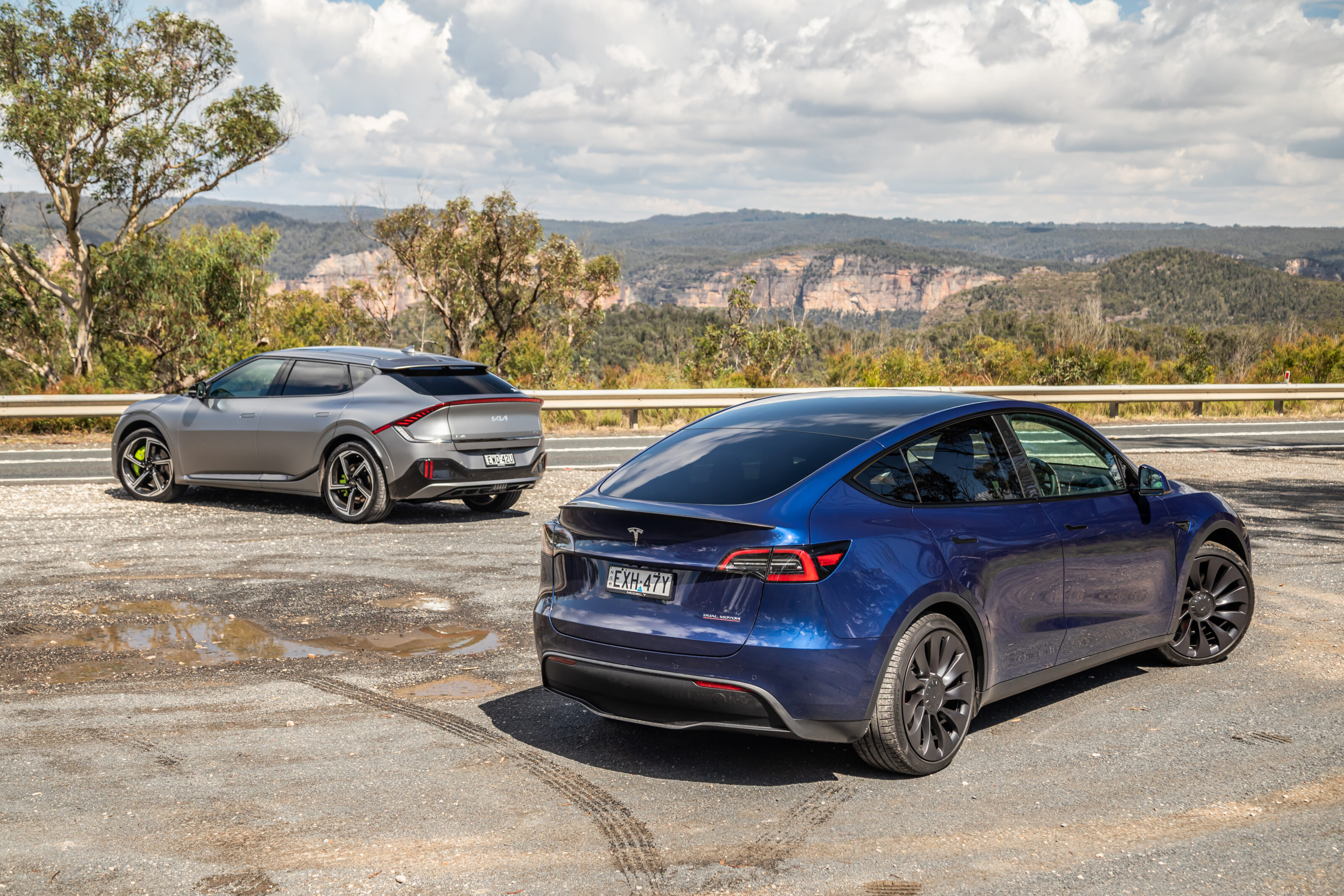
As usual, it’s devoid of any meaningful performance credentials beyond Tesla’s 0-100km/h claim of 3.7 seconds, and 514km WLTP driving range.
For half the price, both tested cars eclipse an Audi RS6 in a straight line, but which is best?
Additionally, for nearly $30K more, are these hi-po battery bandits really better than conventional variants?
JUMP AHEAD
- Pricing and features
- Comfort and space
- On the road
- Driving range and charging
- Safety
- Ownership
- VERDICT
- Specifications
Pricing and features
The Kia and Tesla align neatly on price. The EV6 GT starts at $99,950 before on-road costs, and the Model Y Performance is a little cheaper ($98,955 including luxury car tax).
Diving into the value equation of each shows the stark difference between Tesla and its legacy carmaker rivals. The EV6 GT costs $27,360 more than the entry-level Air RWD, but for that, you get a laundry list of extras: 21-inch alloy wheels, Michelin Pilot Sport 4S tyres, adaptive dampers, 64-colour ambient lighting, heated manual sports seats, active sound design, AR head-up display, 14-speaker Meridian sound system, sequential indicators, power tailgate, and active headlights.
Meanwhile, in Tesla-land, the laundry list reads like that of The Emperor who bought New Clothes. On top of an extra motor and a bigger battery pack, it’s got some red brake calipers (which were quietly downgraded from Brembos), metal pedals, a carbon-look lip spoiler, 21-inch alloy wheels, LED foglights, and a subtle ‘dual motor’ badge. Not a lot, is it?
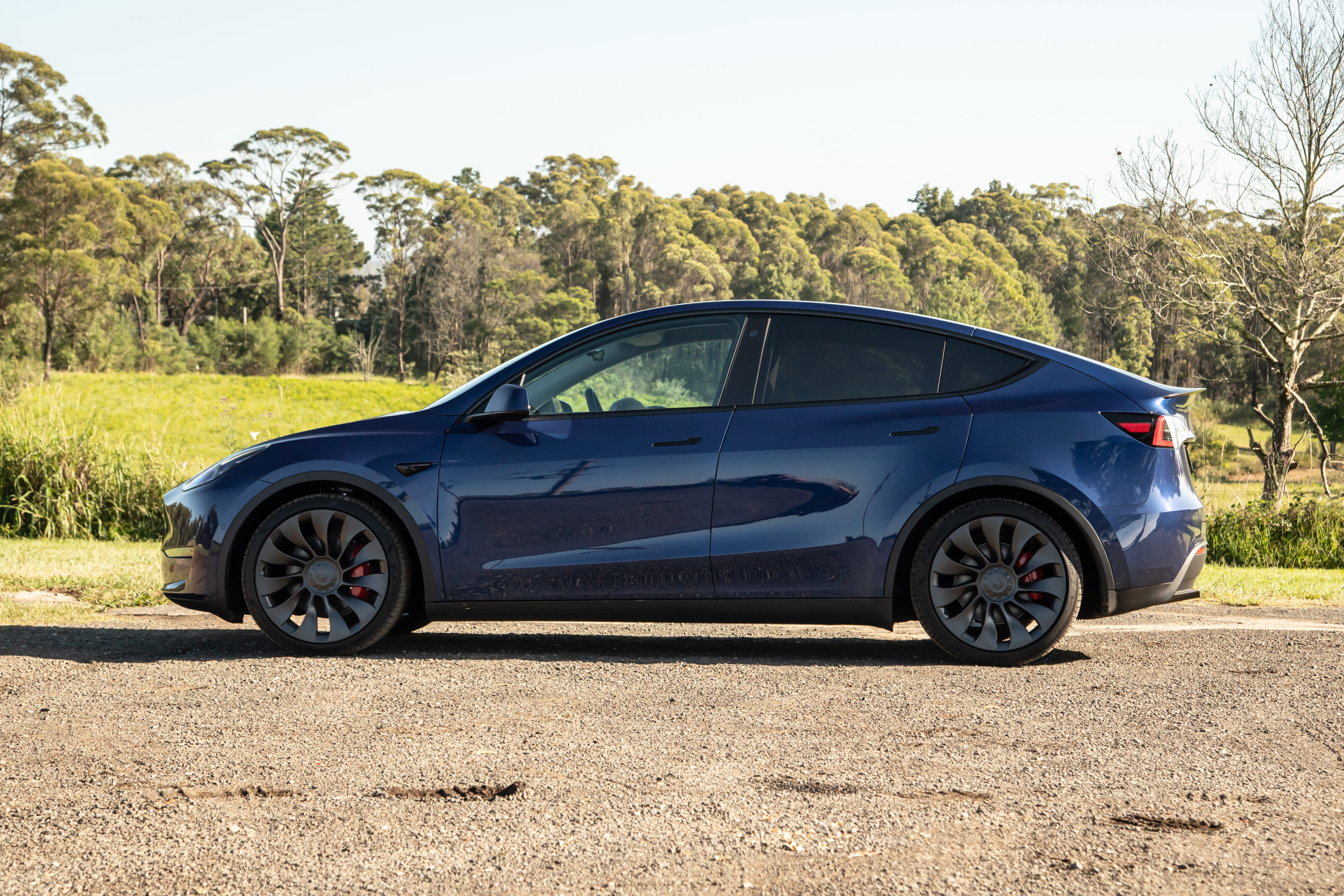
While the EV6 GT’s matte Moonscape duco and fluoro green accents may not be to everyone’s liking, the Model Y Performance suffers from the same dowdy egg-like appearance as the regular car (even on 10mm lower springs).
Meanwhile, the EV6 GT’s taught bodylines, sloping roof, aggressive rear spoiler, and angry daytime running lights leave the Tesla for dead in the attractiveness stakes.
The Performance still benefits from Tesla’s large 15-inch touchscreen with Google Maps, Netflix, and other downloadable applications including games you can play while charging. The gimmicks continue with Whoopee Cushion mode, Light Shows and a crackling fireplace mode.
The Tesla ecosystem is part of the Model Y’s value equation and it’s hard to argue with such customisable and powerful infotainment. For the old-school among us, though, it can be tricky to ignore the lack of traditional dials – a simple head-up display would alleviate this.
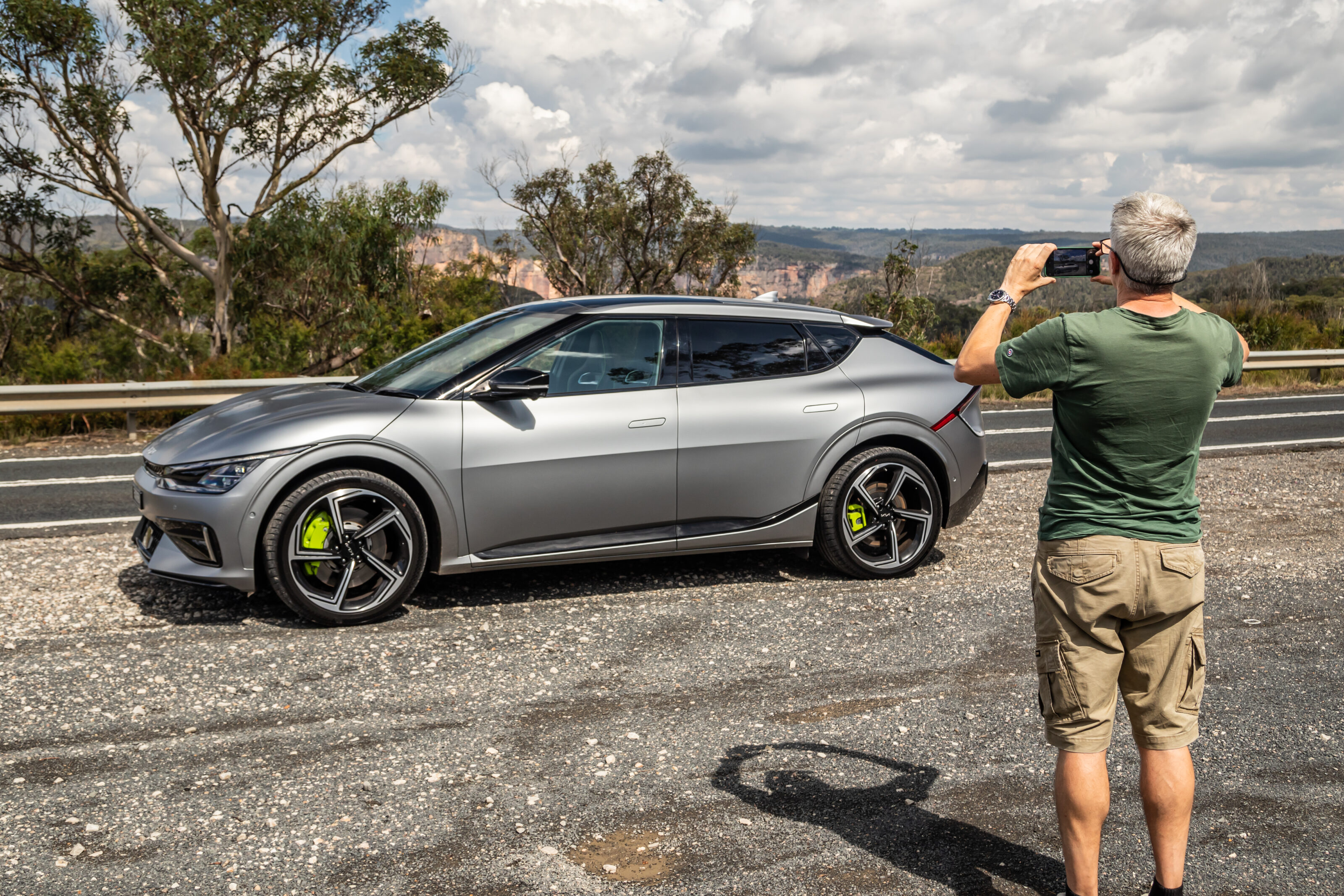
Comfort and space
The Tesla Model Y has a mighty practical and livable interior and would make a stunningly capable family hack.
There’s ample space in the back for three adults, and they’ll have a great view out thanks to the large glasshouse and stadium seating. USB-C charging ports will keep devices juiced up, and a fold-out armrest keeps shoulders from growing tired.
The boot’s capacious as well (Tesla claims 864L), and there’s a huge tub beneath the floor for more hidden storage. The 60-40 seatbacks fold on an electric actuator, and the 117L ‘frunk’ is genuinely usable, unlike the EV6’s 20L space.
The seats, identical to the regular Model Y, are okay in terms of comfort but provide little in the way of performance-focused bolstering. They are electrically adjustable at least, unlike the $100K Kia’s seats, but the driving position is oddly high.
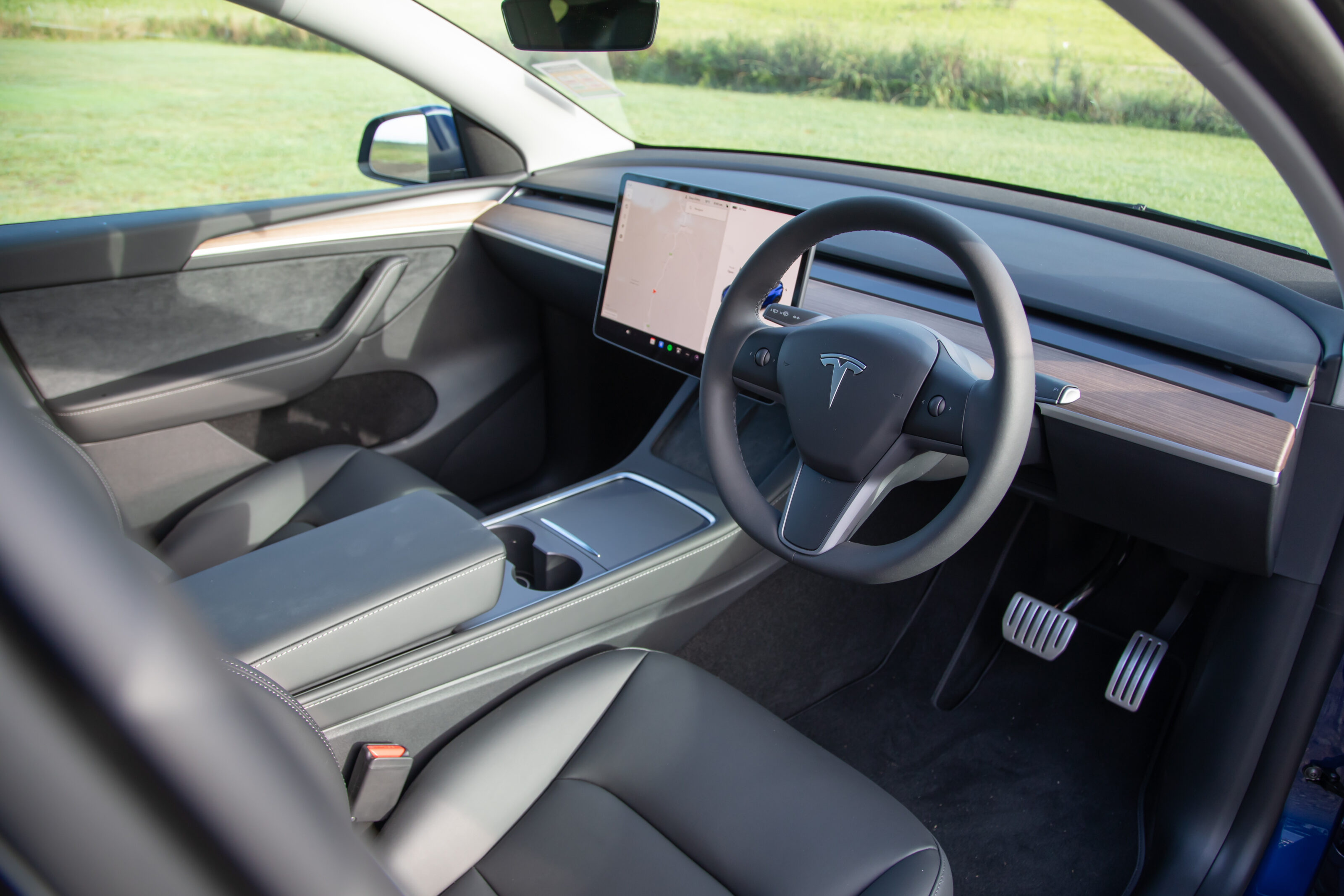
In Australia’s biting sun, the Model Y’s black vinyl upholstery becomes intolerably sweaty. White bamboo-based ‘vegan leather’ is optional, but that fixed glass roof still lets a lot of heat in. Cooled seats are a vexing omission.
Incidental storage is excellent, however. The industry-best twin wireless charging pad is an ergonomic triumph, the cup-holders fit bottles and coffee cups, while the door bins are flocked inside. The wood veneer dash inlays are attractive, too.
Tesla’s build and material quality has come leaps and bounds over early examples, but our car still had a niggling rattle from the rear bench.
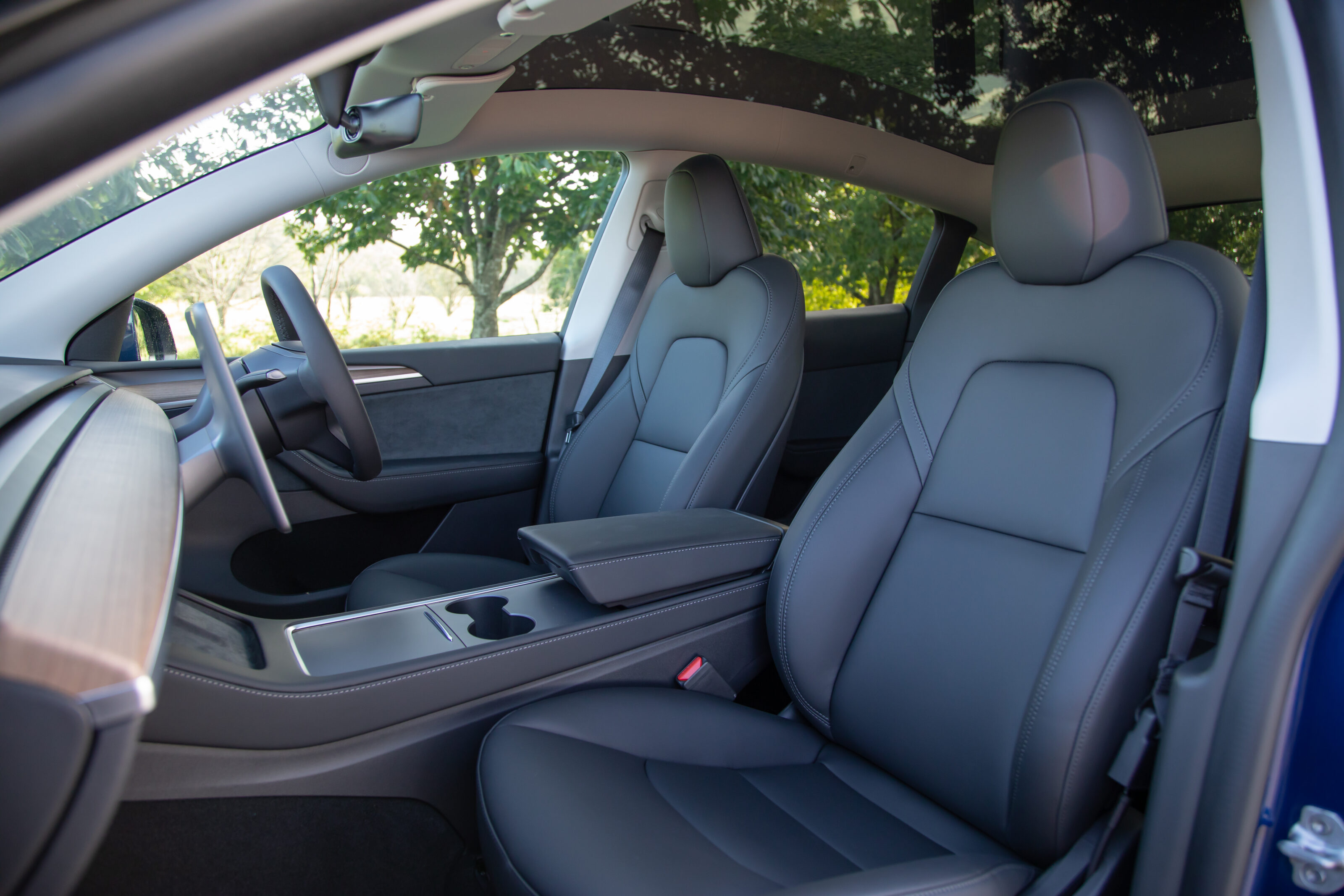
Kia’s approach to interiors is very different indeed.
You’re set so low in the EV6 GT, those suede cloth-upholstered bucket seats hug you like true performance items. But they’re manually adjusted, and unlike the GT-Line, don’t have fan cooling.
The EV6 GT has some welcome interest in the cabin next to the minimal Tesla, with fluoro stitching, customisable ambient lighting, and futuristic design language. Storage is good too – the floating centre console leaves a perfect space for small bags, and the centre bin is deep with a nifty, angled wireless charging pad on top.
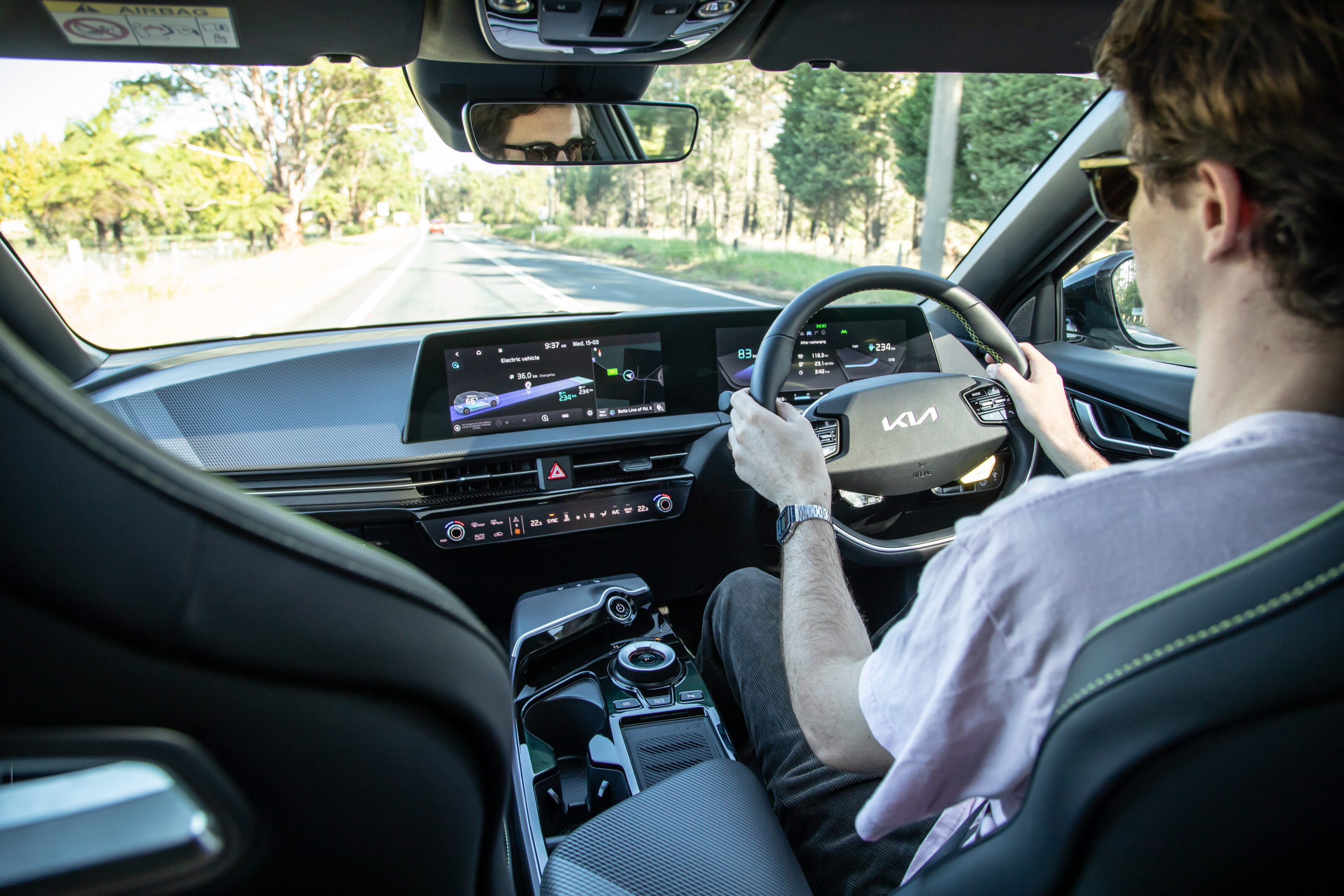
What Kia can’t be forgiven for is not installing auto-down windows in the second row. It’s a common affliction with Kia models – less egregious in a Stonic, but this is a $100K car. What gives!
The back seat is otherwise excellent. Vast legroom and headroom complemented by B-pillar vents, two USB-C charging ports, and a fold-down armrest. The svelte front buckets don’t impede vision, though privacy glass, a porthole sunroof, and small rear windows make the EV6 a dark place to be. With thoughtful under-floor storage, a five-position backrest, and shopping bag hooks the EV6’s 480L boot is smart, if not able to match Tesla’s volumetrically.
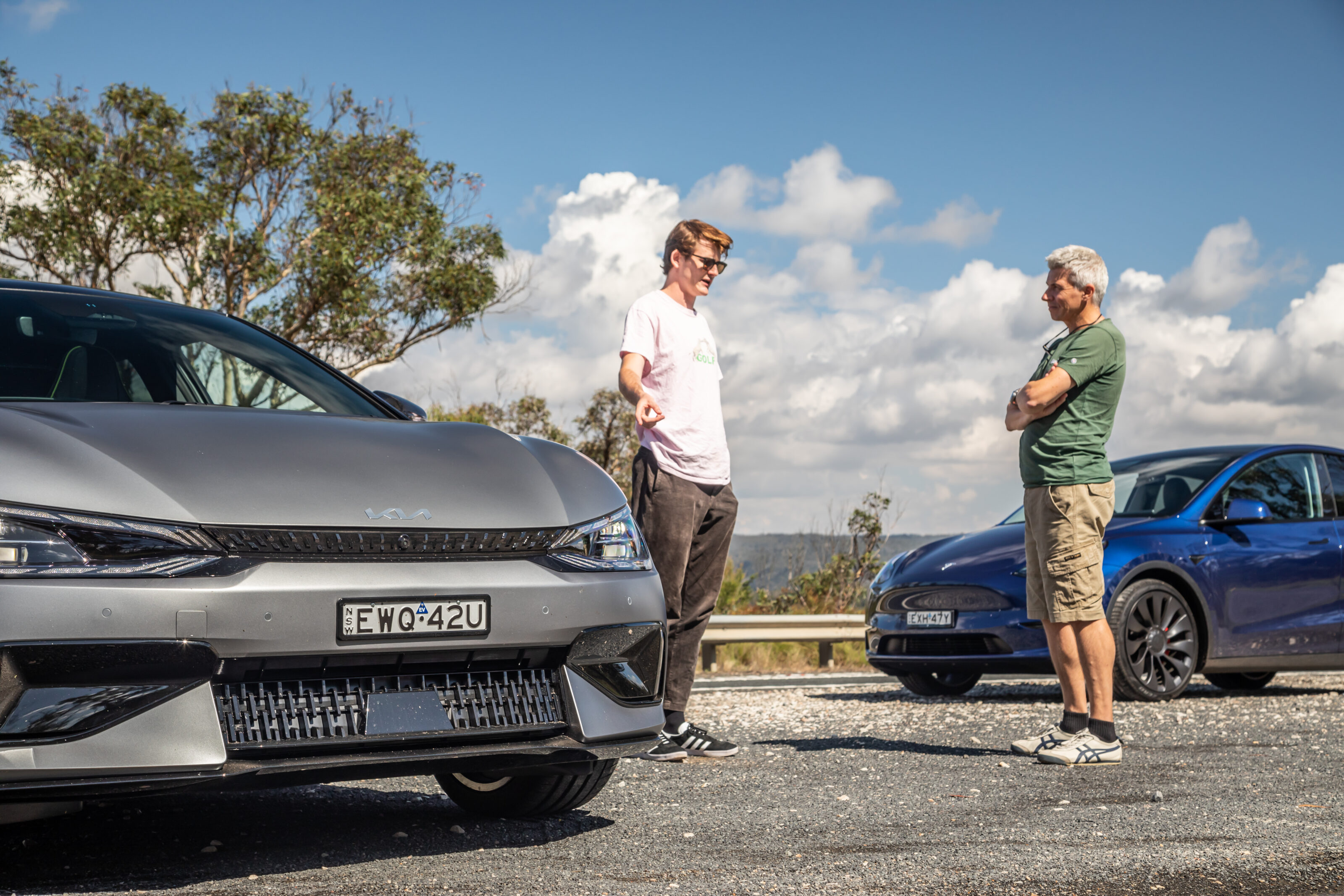
On the road
The Model Y Performance and Kia EV6 GT are forces of nature. Two-tonnes of metal being flung at the horizon by 430kW/730Nm in the Kia’s case, and approximately 393kW/660Nm for the Model Y.
The Model Y’s initial snap is more visceral, yet its electronic smarts limit wheelspin to a minimum expertly. The EV6 GT seems to be limited slightly as you mash the gas, but delivers a swelling tsunami of grunt and keeps pulling.
It all happens in sophisticated silence (unless you engage one of Kia’s strange Active Sound Design noises). And, in truth, the speed gets old pretty fast – a one-trick pony does not a great car make.
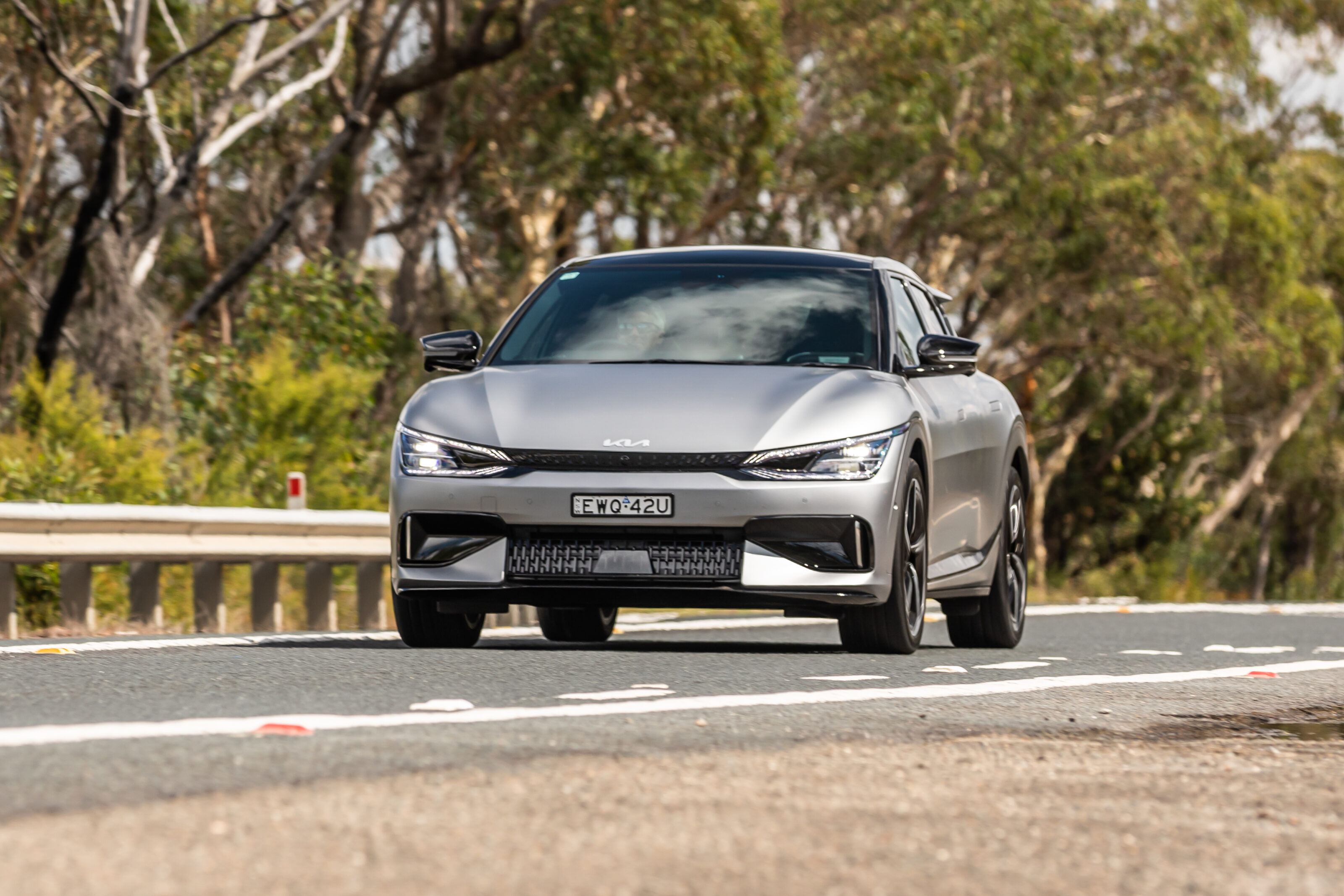
Separating the two, then, comes down to the chassis. And from past tests, the EV6 (2022’s Wheels Car of the Year) should have the upper hand. Interestingly, the Chinese-built Model Y arrived with Tesla’s new ‘Comfort’ suspension tune.
Its updated settings should make for better bump absorption. Tesla’s Chinese arm claims improved support from the dampers in the mid-stroke, and better compliance. It even hints that the car will perform better on track.
The difference is noticeable – this Model Y moves through its stroke more seamlessly than the example we had at Car of the Year. I remember saying to Jez: “if this Model Y had been at COTY, it might have won”… but that was after 30 minutes of straight and decently-surfaced tarmac.
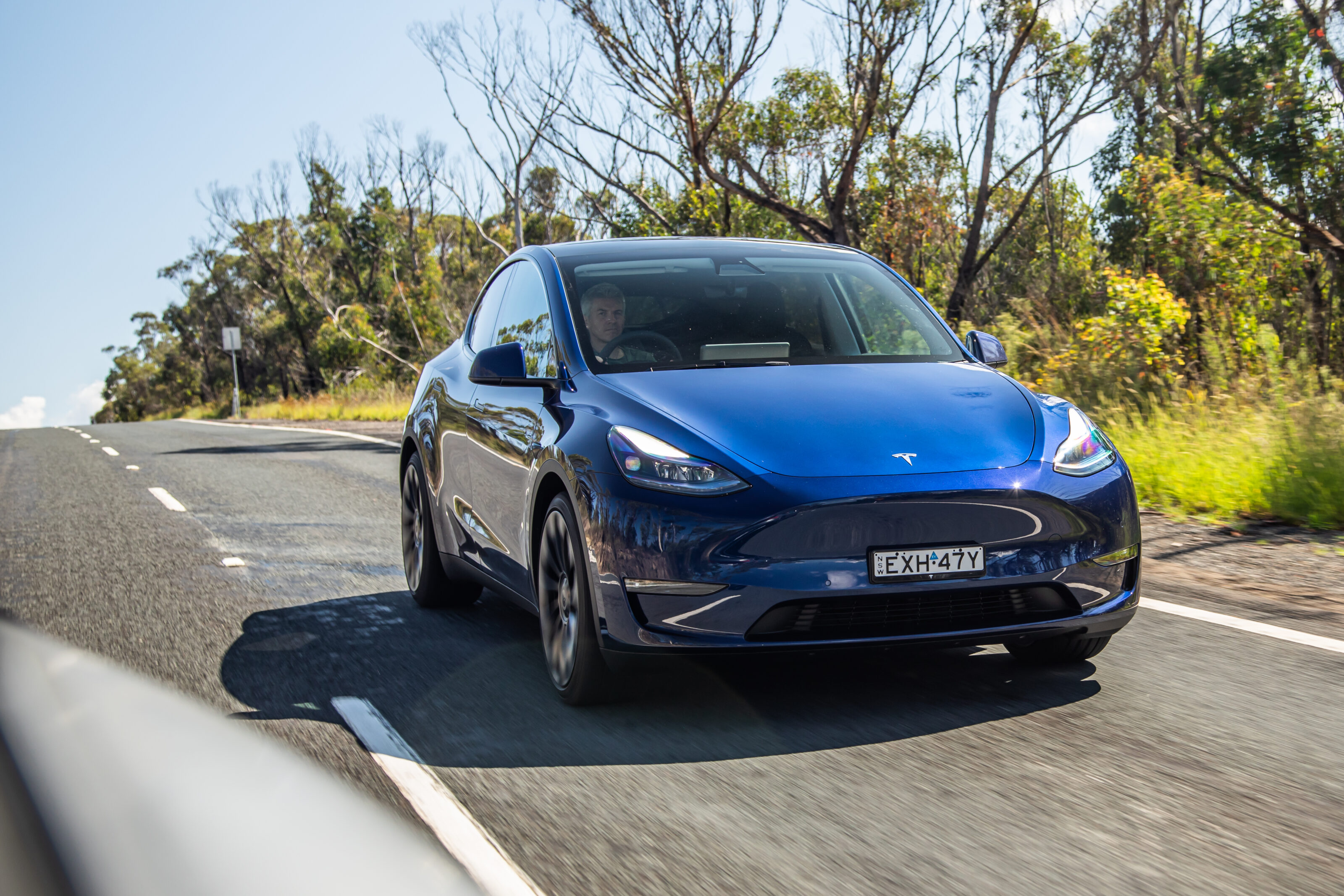
Tesla’s regenerative braking is strong and reliable, although when you need the brake pedal it’s mushy and not confidence-inspiring. Forward vision is generally excellent, owing to the high seating position and huge front windscreen, but the tiny rear window makes it hard to judge the rear of the Model Y.
Swapping into the EV6’s snug bucket seats on the bumpy Bells Line of Road re-iterated Kia’s suspension tuning nous. Sometimes Kia goes a little too far (case in point: Cerato GT) but the EV6 GT is superbly judged.
The quality Sachs adaptive dampers have so much support, yet retain supple absorption on small bumps. The EV6 is firm, but never crashy, even at low speeds on 255/40R21 Michelin Pilot Sport 4S rubber. A hint of front suspension thump is evident around town, but it’s never as troublesome as the Model Y’s incessant rear suspension boom.
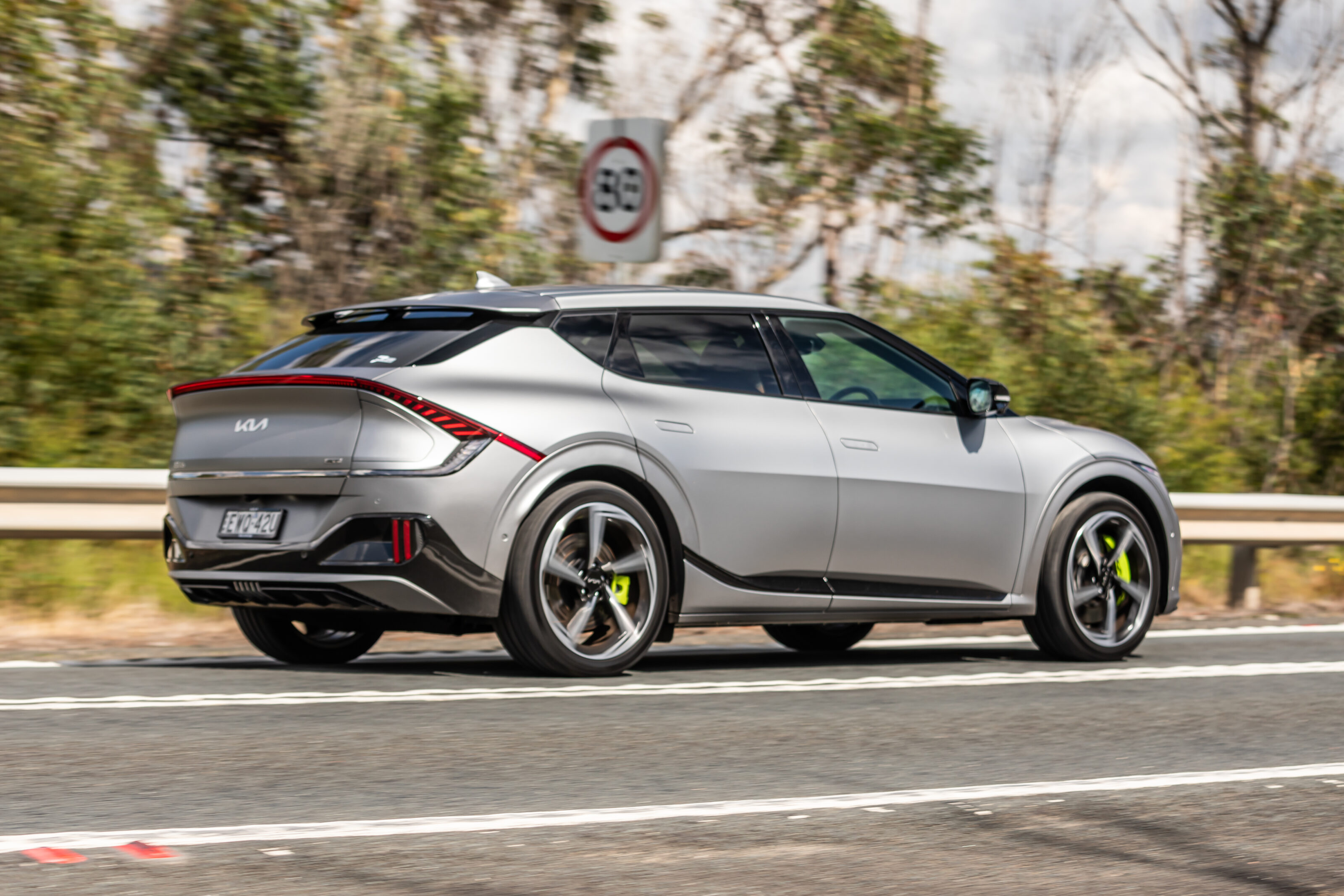
The EV6 GT’s four-piston front brakes inspire confidence when you need them, although Kia’s regenerative braking (adjustable with flappy paddles) isn’t quite as sophisticated as Tesla’s. And, when you spark up the car, it resets to Level 2 as default, even if you were last using ‘i-Pedal’ one-foot driving.
Sexy sequential indicators engaged, the EV6 GT led the Model Y performance off the main road onto our chosen stretch of tarmac to test their ride and handling. An initial sighting run in the EV6 GT had me questioning if the road was as treacherous as I’d remembered, such was the Kia’s composure.
The Model Y Performance reminded me that, yes, this bit of bitumen really is a goat track. It may be riding on a new chassis tune, but mid-corner bumps still send the Model Y’s body bucking and corkscrewing well below the posted 100km/h speed limit. I’m not so sure that softer is better in this case, as it’s even easier to find the bump stops.
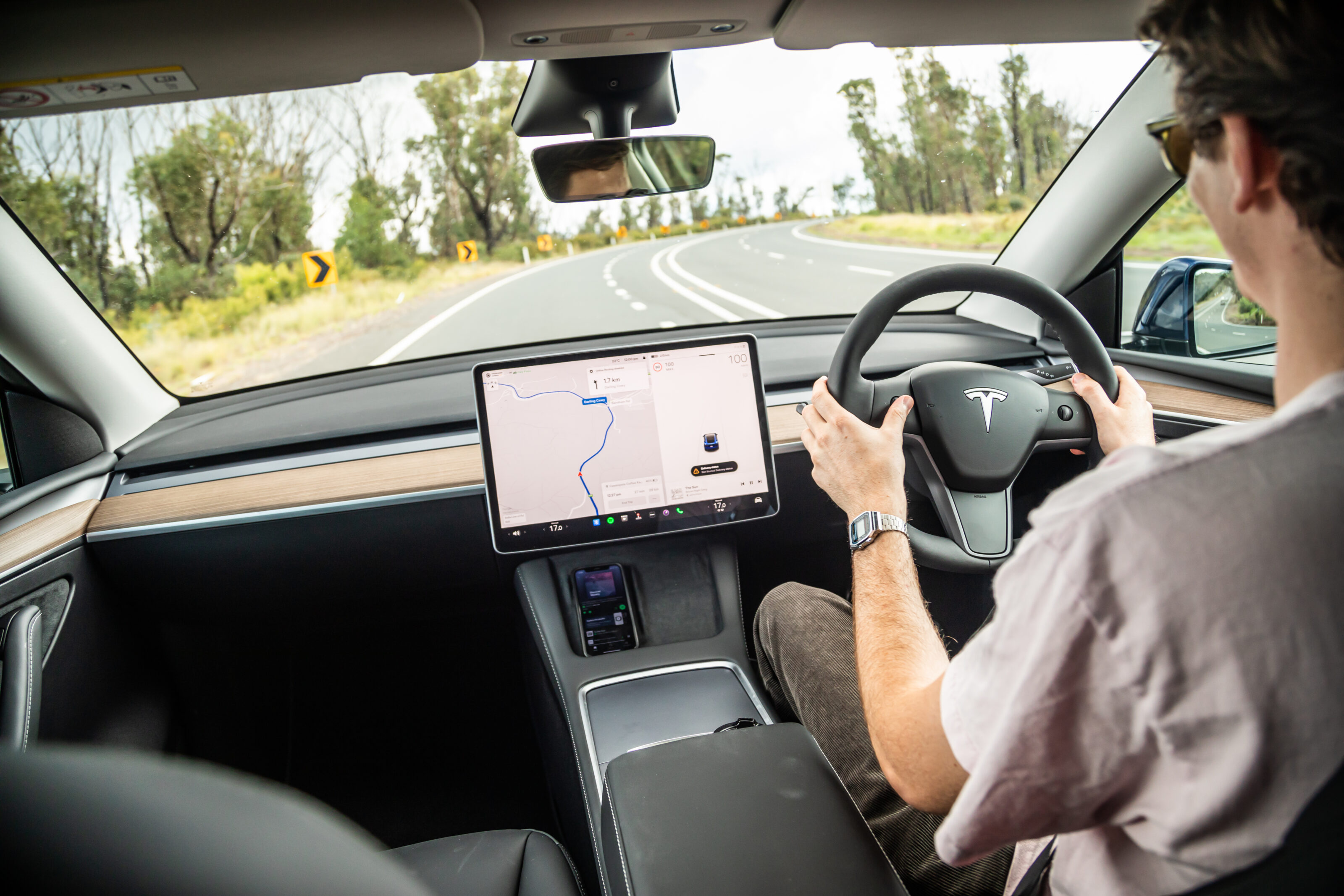
An initial sighting run in the EV6 GT had me questioning if the road was as treacherous as I’d remembered, such was the Kia’s composure. The Model Y Performance reminded me that, yes, this bit of bitumen really is a goat track.
Super sharp steering (two-turns lock-to-lock) doesn’t aid confidence. Not an issue in the low-set Model 3 sedan, but it makes the taller Model Y feel nervous and unsettled. The wheel is prone to rack rattle, too, and there’s a dead-spot on-centre that grates on freeway slogs.
After futzing around with drive modes in both cars (the Model Y doesn’t have any useful settings; steering is either claggy or claggier), I settled on preferences. In the EV6, with its adaptive dampers, Normal works for most driving.
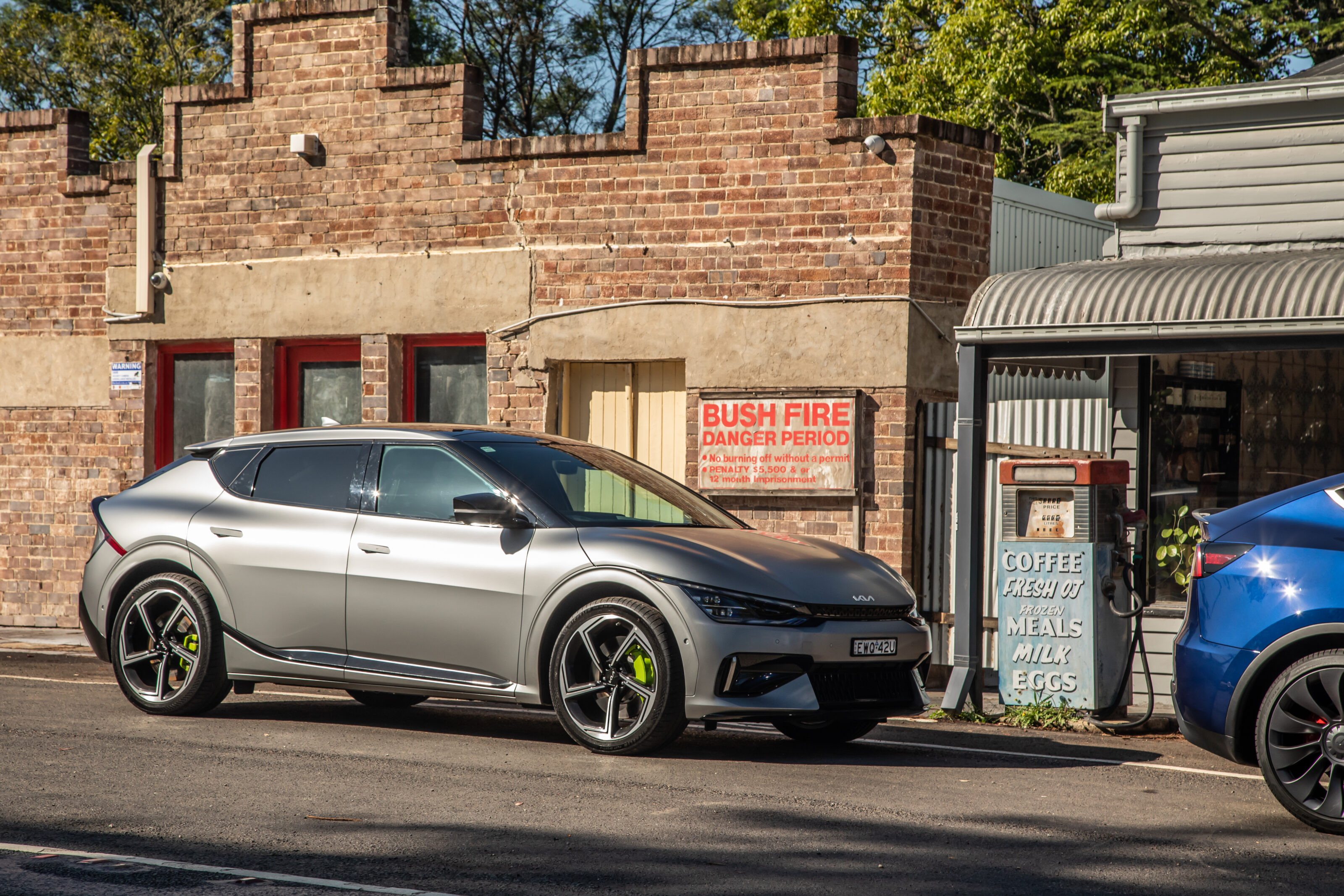
A customisable ‘My’ mode (easily accessible with two taps on the fluoro GT button) was for getting stuck in, with Sport throttle, Sport+ steering, Track ESC, and Sport dampers.
Proving its point, the EV6 GT was magic on the back-to-back road in ‘My’ mode. Its steering is calmer (2.3 turns lock-to-lock) and more consistently weighted.
Useful information about the surface and grip level make its way through the two-spoke tiller, but mainly the seat of the pants – amplified by sparsely-padded chairs. The EV6 GT is further aided by double ball-joint front suspension that freed-up castor and trail adjustment, improving steering feel.
Speaking to chassis dynamicist Graeme Gambold (above), he revealed that Australian EV6 GTs run higher compression and lower spring rates for better control of the body without the jiggle associated with excess rebound damping.
With all this at your disposal, commitment is easy. The EV6 GT sits flat and poised, allowing the driver to adjust attitude using the throttle.
Where the Model Y is rolling, yawing, and all at sea, the EV6 GT is encouraging you to start powering out of bends, with oversteer available from the rear-mounted e-LSD if you’re brave enough. It left the Model Y Performance floundering in the distance.

Australia’s best electric cars for 2023
We’ve tested nearly every EV below six figures in Australia to rank the best on sale today
Driving range and charging
We undertook an average Sunday loop, heading west of Sydney towards the Blue Mountains from a fast charger near Penrith. The elapsed distance was 209km for both cars.
Neither the Tesla Model Y Performance nor the EV6 GT matched their respective 514km and 424km WLTP combined driving ranges, but the EV6 GT came closer.
A real-world Sunday drive would see the Model Y capable of 421km, and the EV6 GT 367km. The EV6 GT’s driving range is somewhat restrictive… lucky it charges so fast.
| Driving rangeu00a0 | Tesla Model Y | Kia EV6 GT |
|---|---|---|
| Battery size (usable) | 75kWh* | 77.4kWh |
| WLTP range | 514km | 424km |
| WLTP consumption | 14.6kWh/100km | 20.6kWh/100km |
| Tested range | 421km | 367km |
| Varianceu00a0 | -18.1% | -13.4% |
| Tested consumption | 17.8kWh/100km | 21.1kWh/100km |
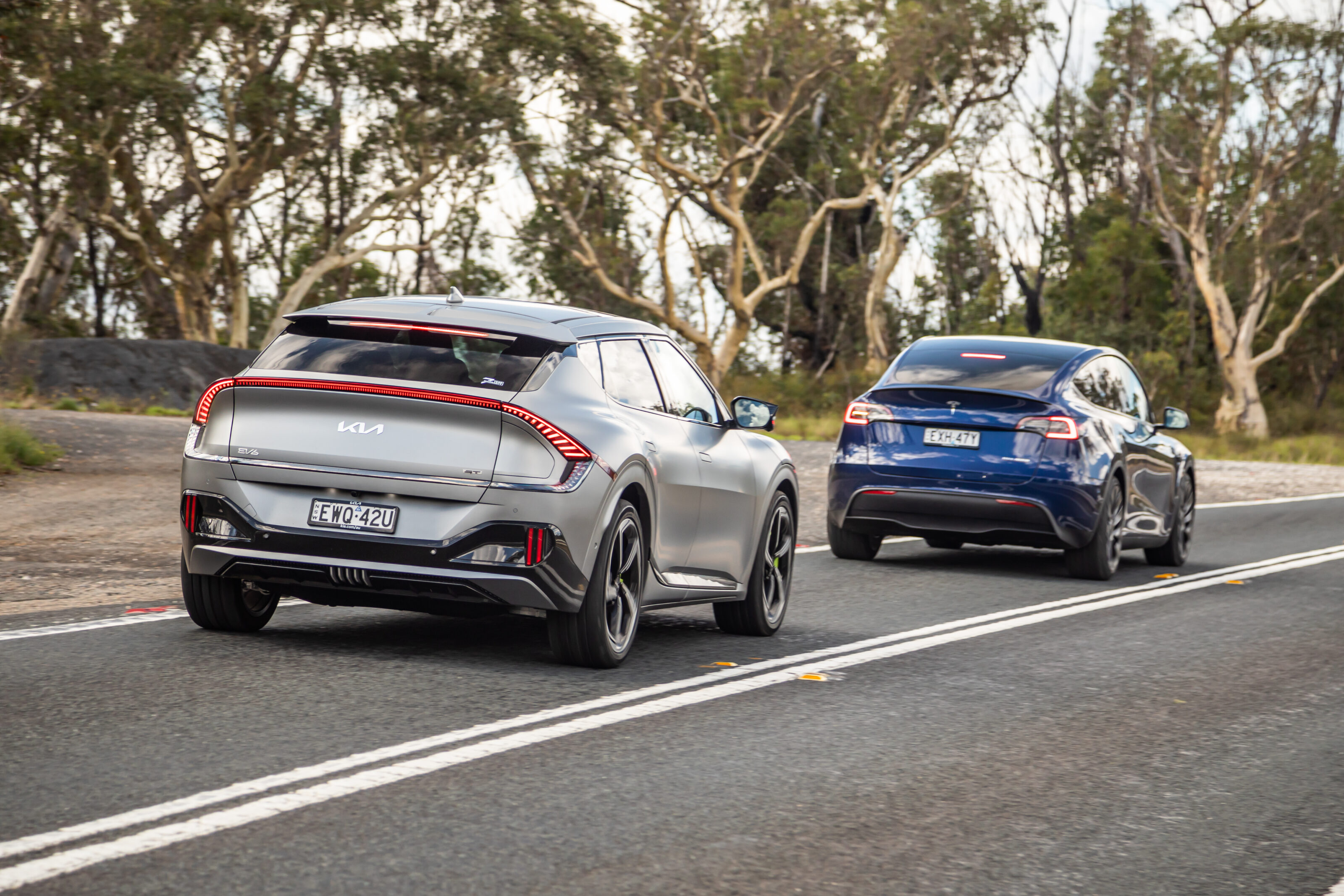
When it comes to charging, the E-GMP’s 800-volt architecture reigns supreme. Hooked up to a 350kW station, the Model Y added 15kWh of charge (84km range) in 8:01 – the EV6 GT did the same volume of electricity (or 71km range) in 4:47.
The table below shows the observed peak speeds on the charger – the EV6 held 220kW-plus until it climbed over 70 per cent, while the Model Y dropped off sooner.
| Public fast-charging | Tesla Model Y | Kia EV6 GT |
|---|---|---|
| Claimed 10-80%u00a0 | 27 minutes | 18 minutes |
| Adding 15kWh | 8 minutes 1 second | 4 minutes 47 seconds |
| Observed peak power (DC) | 151kW (@ 37%) | 230kW (@ 50%) |
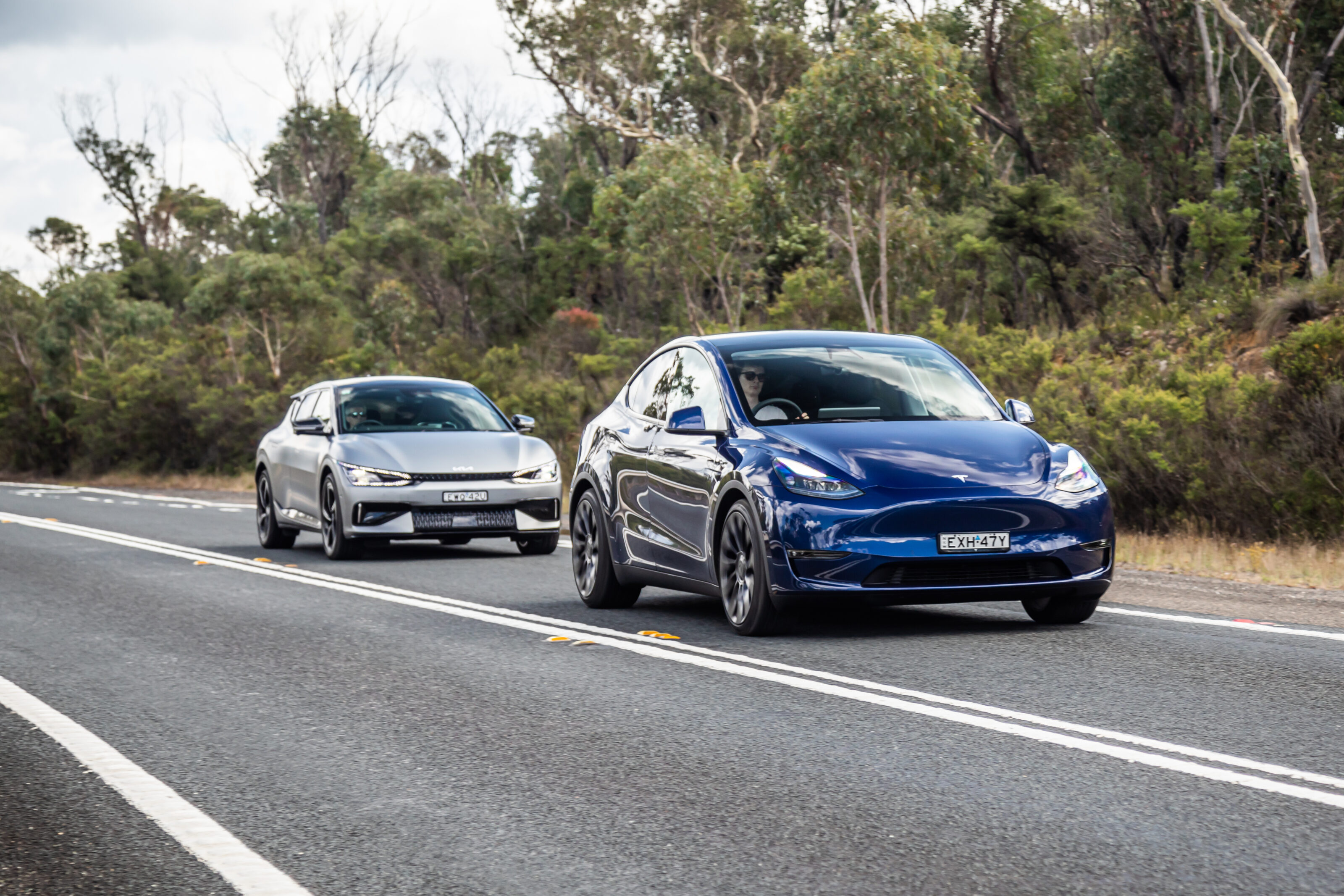
Safety
The Tesla Model Y was awarded five stars in 2022 ANCAP safety testing.
Tesla may be known for its controversial autonomous tech, but the basic systems aren’t leagues better than the Kia’s. You can pay $5100 more than the list price to get Enhanced Autopilot which adds auto lane-change, and the ability to follow navigation directions on freeways. ‘Full self-driving’ is available for $10,100 but is not yet active in our market.
Both the EV6 GT and Tesla Model Y are fitted with AEB that detects pedestrians, cyclists and crossing traffic, lane-trace assist, blind-spot monitoring, and rear cross-traffic alert.
Correction: this review previously stated the EV6 GT scored five ANCAP stars. While the regular EV6 did, the GT is technically unrated as it is fitted with different seats, meaning the performance model would require retesting a five-star certification.
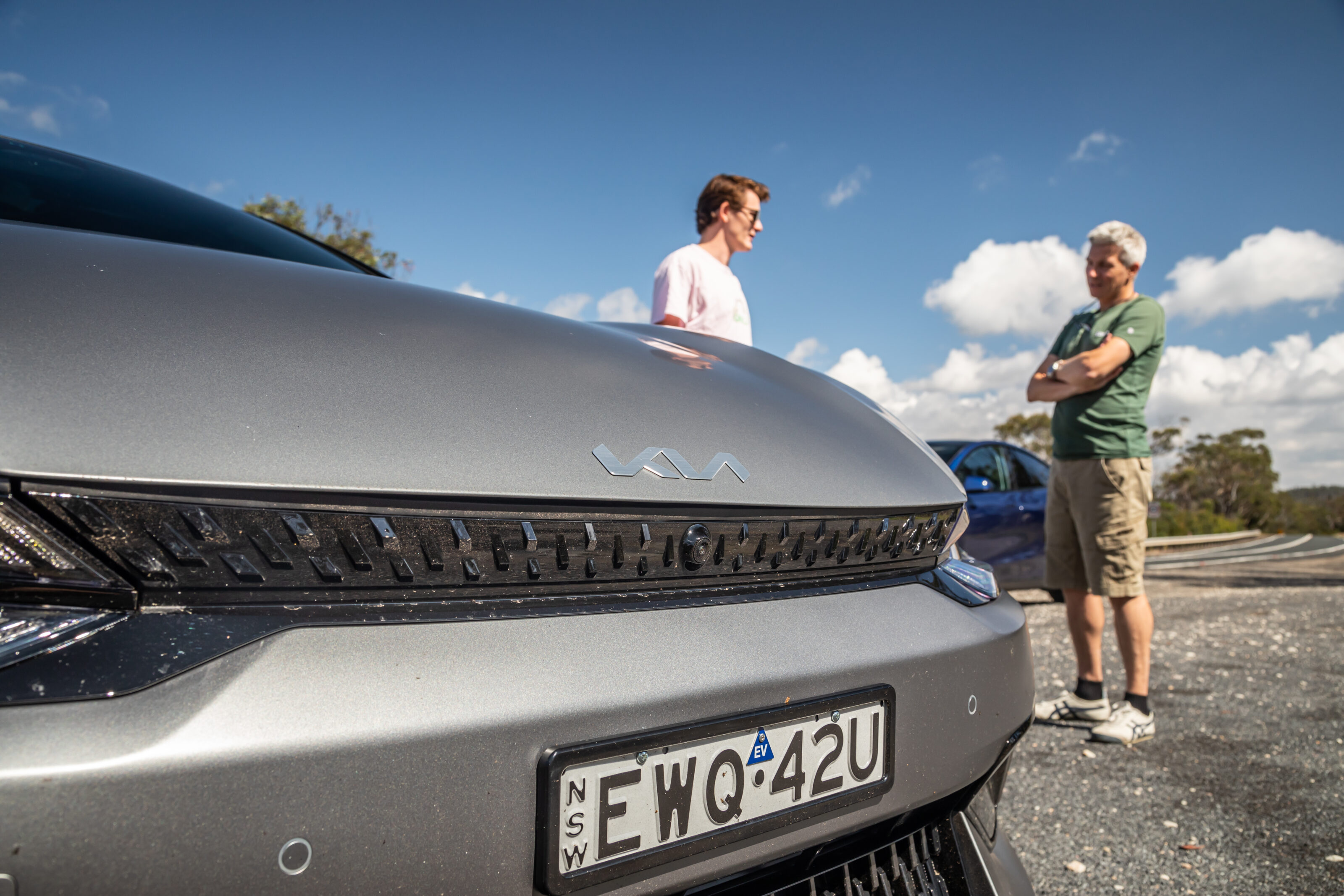
Ownership
A seven-year / unlimited-kilometre warranty combined with Kia’s vast dealer network is sure to appeal to a more traditional car buyer.
Servicing needs to be carried out every 12 months/15,000kms, and will cost $1371 if you pay upfront.
Meanwhile, Tesla’s hands-off, minimal maintenance, and over-the-air software updates are undeniably big selling points. The Model Y will alert you when it needs servicing via the app, and Tesla does not provide a price guide.
With 60c/kWh Supercharger locations gradually opening up to other makes, Tesla ownership isn’t quite as exclusive as it once was, but it’s still a solid and futuristic experience.
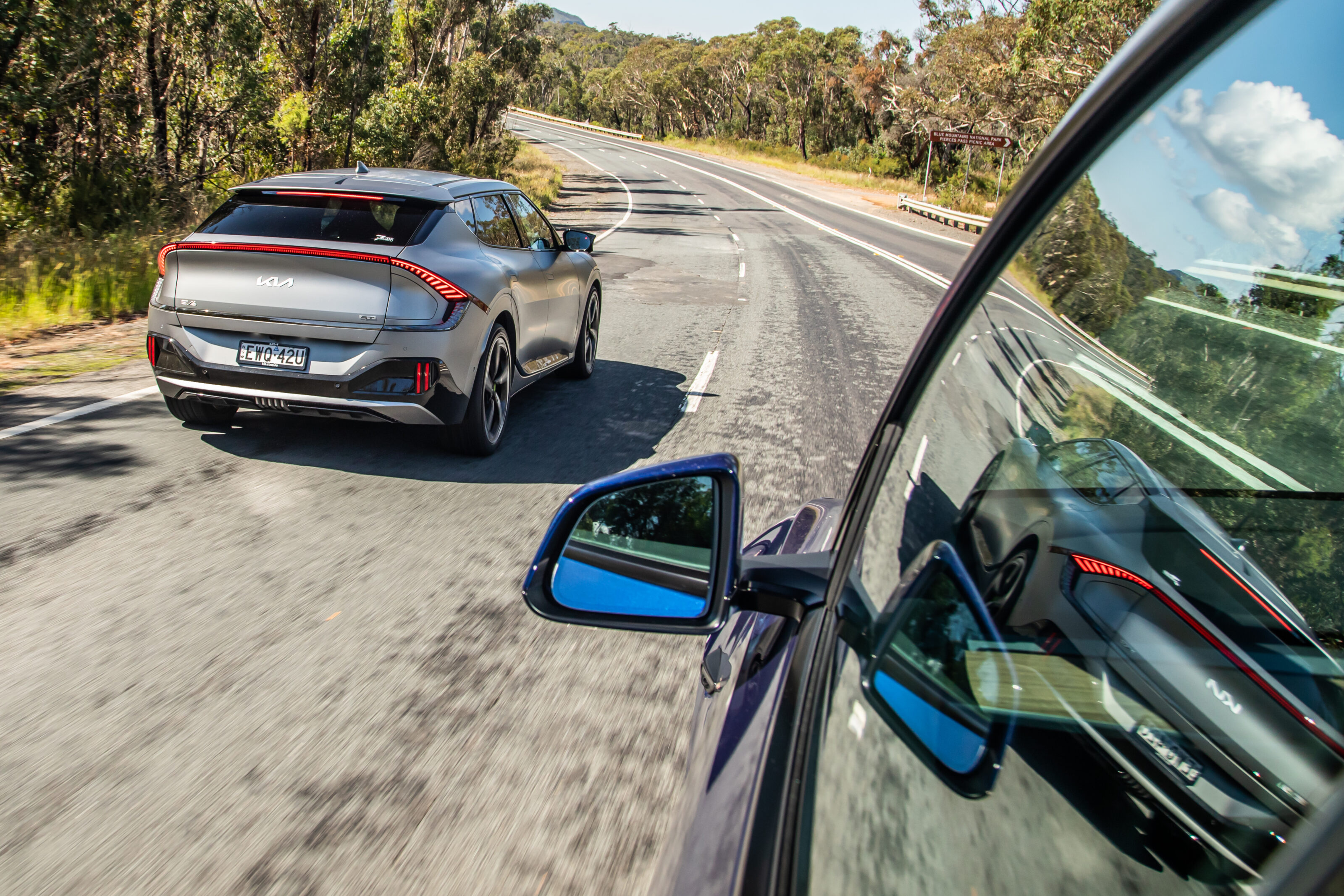
VERDICT
The Tesla Model Y Performance has an old-school muscle car vibe about it (minus the rumbling V8s, live axles, and leather jackets). More power than you could ever need, barely contained by its Pirellis and a chassis that’s at boiling point.
Kia has crafted a far more cohesive stupid-fast electric SUV. There’s so much support and encouragement from the chassis, that suddenly 430kW doesn’t feel so scary. You can really feel where Kia has spent that extra money, not only on motors and battery development, but making it a car that is involving, and joyful to drive.
If you’re convinced of a Model Y – and there are plenty of reasons why you would be (not least availability) – the rear-wheel drive is plenty. It gets all the same technology, cabin appointments, and more-than-adequate power for $29K less than the Performance.
With Model Y Performance, Tesla has made a very fast and technology-packed car. What Kia has done, is make a performance car out of the EV6.
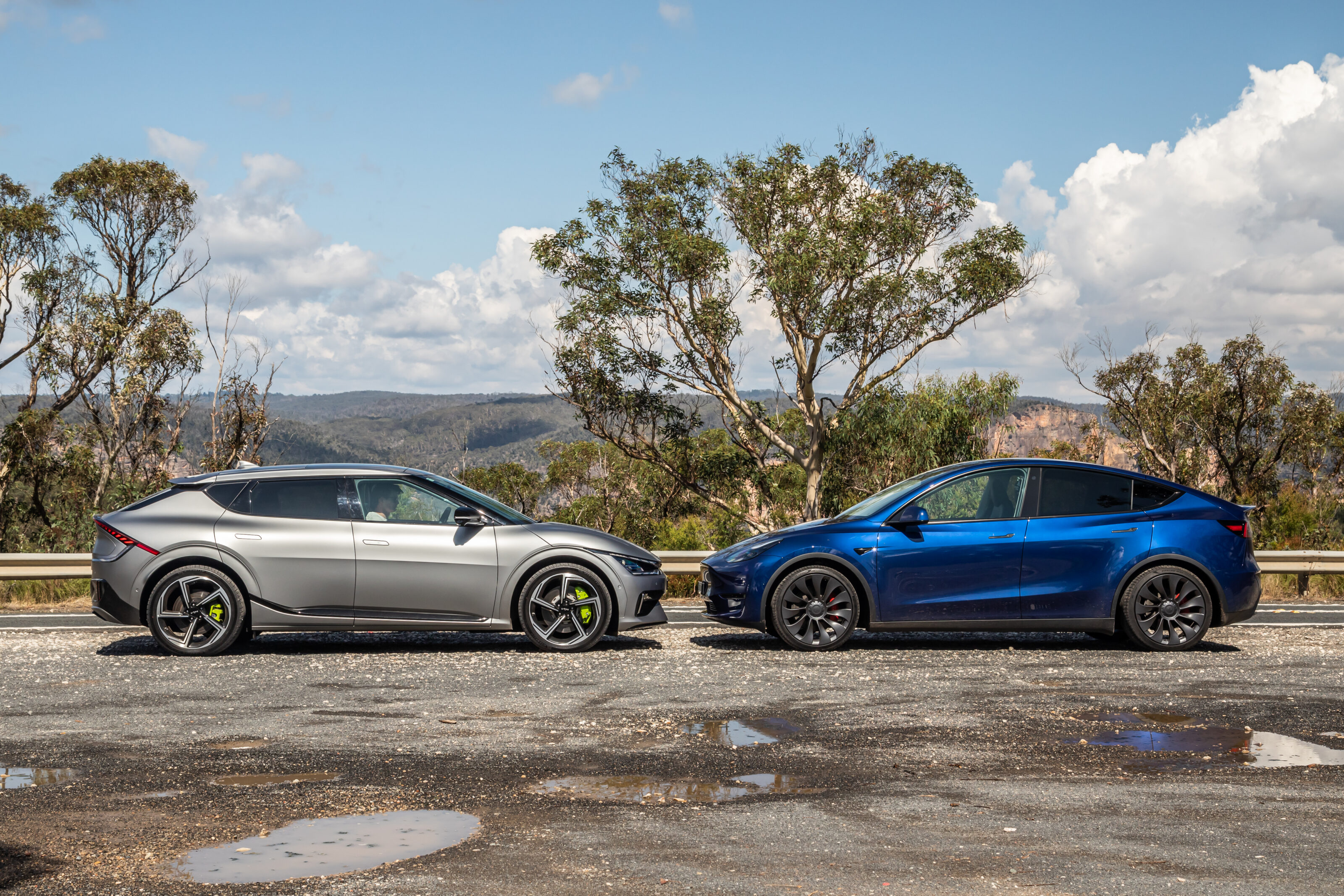
SCORING
Kia EV6 GT: 9/10
Things we like
- Engaging chassis
- Futuristic cabin design
- Absurd speed
- Great steering
Not so much…
- Dark second row
- Manual seat adjust
- Conventional servicing schedule
Tesla Model Y Performance: 8/10
Things we like
- Airy, spacious cabin
- Powerful infotainment
- Improved bump absorption
Not so much…
- Awkward, clumsy dynamics
- Lacks differentiation from RWD
- Noisy suspension
| Tesla Model Y Performance | Kia EV6 GT | |
|---|---|---|
| Safety, value and features | 7.5 | 8.5 |
| Comfort and space | 9 | 8.5 |
| Engine and gearbox | 8.5 | 9 |
| Ride and handling | 6 | 9 |
| Technology | 8 | 8 |
| Overall | 8 | 9 |
Specifications
| Model Y Performance | Kia EV6 GT | |
|---|---|---|
| Price | $98,955* + ORCs | $99,950 + ORCs |
| Drivetrain | ||
| Layout | twin-motor AWD | twin permanent magnet synchronous motor AWD |
| System power | 393kW** | 430kW |
| System torque | 660Nm** | 740Nm |
| Gearbox | single-speed reduction gear | Single-speed reduction gear (10.65:1) |
| Chassis | ||
| Body | steel, 5 doors, 5 seats | steel, 5 doors, 5 seats |
| L/W/H/Wu2013B | 4751/1921/1624/2890mm | 4869/1890/1550/2900mm |
| Weight | 1997kg | 2148kg |
| Boot | 864L | 480/1260L |
| Battery | 75kWh** | 77.4kWh |
| Economy | 14.6kWh/100km | 20.6kWh/100km |
| Driving range | 514km (WLTP) | 424km (WLTP) |
| Charging (AC/0-100%) | 11kW/8h 15m | 10.5kW/7h 20m |
| Charging (DC/10-80%) | 250kW (max)/27m | 220kW (approx)/18m |
| Suspension | Front: strut, coil springs, anti-roll bar. Rear: multi-link, coil springs, anti-roll bar | Front: strut, double ball joint, coil springs, anti-roll bar, electronic damper control. Rear: 5-link multi-link, coil springs, anti-roll bar, electronic damper control |
| Steering | electric rack-and-pinion (2.0 L-L) | electric rack-and-pinion (2.3 L-L) |
| Front brakes | 4-piston caliper | 4 piston front caliper, ventilated discs (380mm) |
| Rear brakes | Single-piston sliding caliper | Single-piston sliding caliper, ventilated discs (360mm) |
| Tyres | Pirelli P Zero Elect | Michelin Pilot Sport 4S |
| Tyre size | 255/35R21 275/35R21 | 255/40R21 |
| Safety | ||
| ANCAP rating | five-stars | five-stars |
| Performance | ||
| 0-100km/h | 3.7sec (claimed) | 3.5sec (claimed) |
*Including LCT
**figures based on estimates provided by EV database
We recommend
-
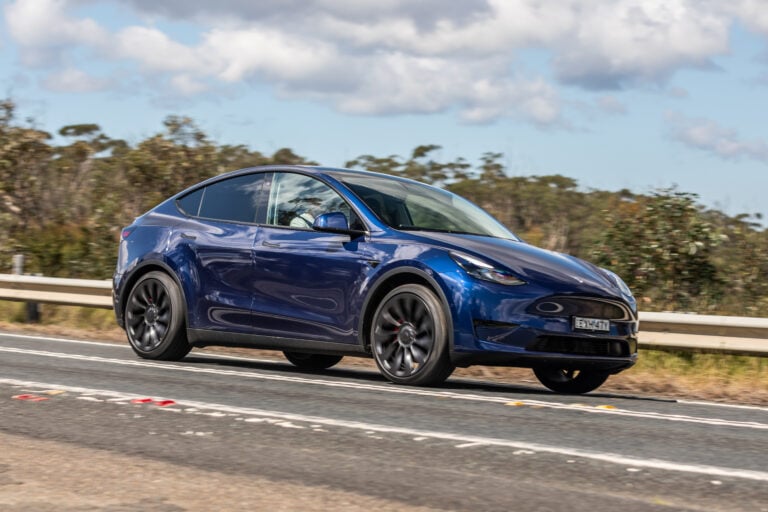 Reviews
Reviews2023 Tesla Model Y Performance review
The fastest version of Tesla's popular electric SUV has landed in Australia at long last, but can the Model Y Performance justify its circa-$30K premium over the base version?
-
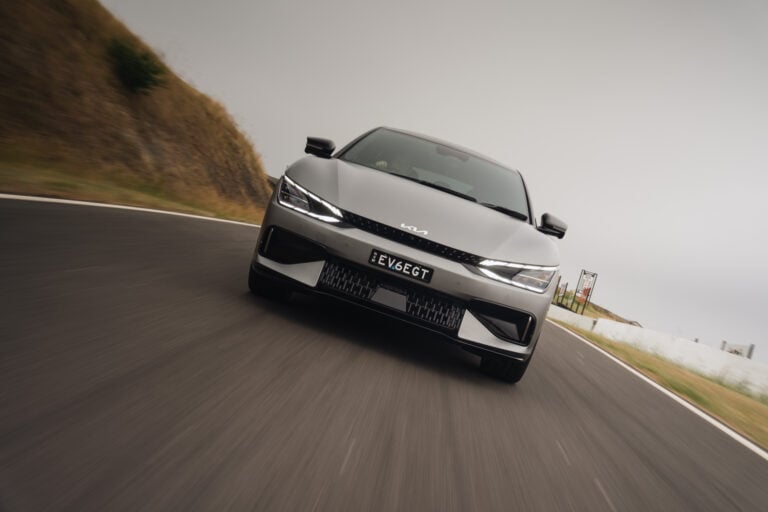 Reviews
Reviews2023 Kia EV6 GT review
The new EV6 GT promises to be as talented on track as it is on road; we hit both in the $100,000, 430kW Kia to find out
-
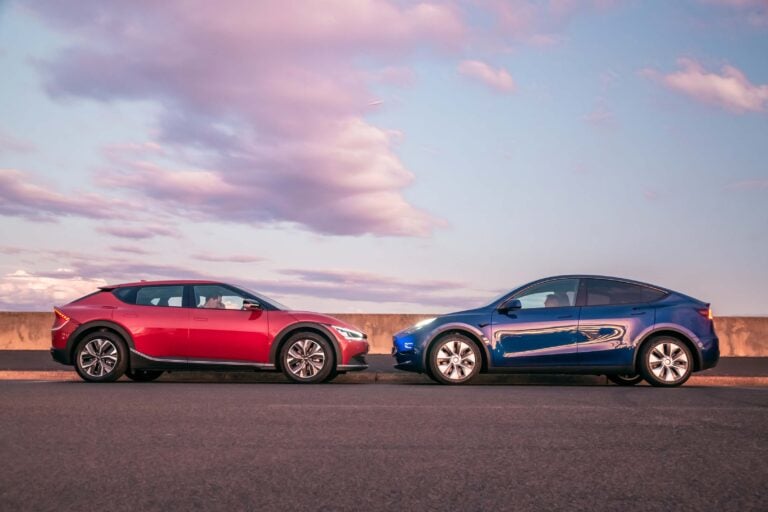 Comparisons
Comparisons2022 Tesla Model Y vs Kia EV6 comparison review
It’s USA v Korea as the most anticipated EV of 2022 faces off against the entry-level variant of our reigning COTY. Brace for shock…



